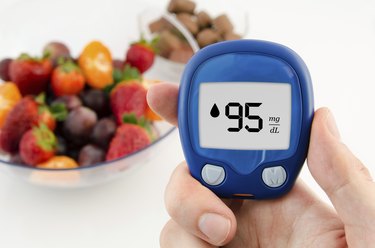
Blood glucose levels and potassium share a complex relationship. Certain complications of diabetes, including diabetic ketoacidosis and hyperglycemia, involve both high blood glucose levels and abnormal potassium levels. Some medications can also cause both elevated blood glucose levels and potassium imbalances. People with blood sugar disorders such as diabetes may benefit from adding potassium-rich food to their diets, as long as they choose foods that are low on the glycemic index.
Diabetes Complications and Potassium
Video of the Day
Complications of diabetes, a disease characterized by chronic high blood glucose levels, may cause potassium levels to be too low or too high. Treatment for diabetic ketoacidosis, a complication of diabetes that occurs in conjunction with uncontrolled high blood sugar and high blood levels of acids called ketones, can cause low potassium levels, which can result in in heart, muscle and nerve problems. Complications from diabetes can also cause potassium levels to rise. People with diabetes being treated for high blood glucose while on long-term dialysis treatment can develop severe hyperkalemia, or excessively high potassium levels.
Video of the Day
Magnesium and Potassium
Like potassium, magnesium is another key electrolyte which may be affected by blood glucose disorders. Magnesium deficiencies caused by diabetes can also upset the body's potassium levels. According to the National Institutes of Health, poorly controlled diabetes can cause magnesium deficiencies, which may in turn cause hypokalemia, or low potassium levels. Individuals with hyperglycemia resulting from poorly controlled diabetes may benefit from taking magnesium supplements, which can also help correct potassium imbalances.
Insulin and Potassium
Insulin, a hormone which helps treat high blood glucose levels, can also affect potassium. Administration of insulin to correct high blood glucose levels may cause a potassium deficiency. However, by increasing your potassium intake while on insulin, you can prevent a potassium deficiency while also improving your sensitivity to insulin and increasing the effectiveness of the drug, according to the Global Diabetes Community.
Potassium-Rich Foods
Increasing potassium intake may benefit you if you have diabetes or another disorder causing high blood glucose levels. Many foods that are high in potassium, including fruits, vegetables, legumes and dairy, are also good sources of another important electrolyte for people with diabetes — magnesium. However, some potassium-rich foods also rate high on the glycemic index, meaning you should avoid them if your body has problems regulating blood glucose. Fruits and veggies are generally good sources of potassium for people with diabetes, although fruit juice and starchy vegetables such as potatoes, corn and peas should be avoided. Some potassium-rich foods suitable to eat if you have diabetes include beans, yogurt, nuts, salmon, tomatoes and spinach.
Blood Pressure Medications
Diuretics prescribed for high blood pressure may cause high blood glucose levels in conjunction with potassium deficiency. Eating foods with potassium or taking a potassium supplement may help prevent potassium loss while taking diuretics, and people with diabetes may also require a change in medication, diet or insulin to control blood sugar while on diuretics. ACE inhibitors, another class of drug prescribed for high blood pressure, and also for diabetes, may cause potassium levels to rise excessively, especially in people with diabetes. Talk to your doctor if you have diabetes and high blood pressure so that you can discuss treatment options that keep both blood glucose and potassium at safe levels.
- MayoClinic.com: Diabetic Ketoacidosis
- Western Journal of Medicine; Serum Potassium Concentration in Hyperglycemia of Diabetes Mellitus With Long-term Dialysis; Antonios H. Tzamaloukas, M.D.; May 1987
- National Institutes of Health Office of Dietary Supplements: Magnesium
- The Global Diabetes Community: Diabetes, Vitamins and Dietary Supplements
- MedlinePlus: Potassium in Diet
- University of Maryland Medical Center: Potassium
- Reader'sDigest.com: 10 Diabetes Superfoods
- HealthierTalk.com: Low Glycemic Sources of Potassium
- American Heart Association: Types of Blood Pressure Medications
Is this an emergency? If you are experiencing serious medical symptoms, please see the National Library of Medicine’s list of signs you need emergency medical attention or call 911.